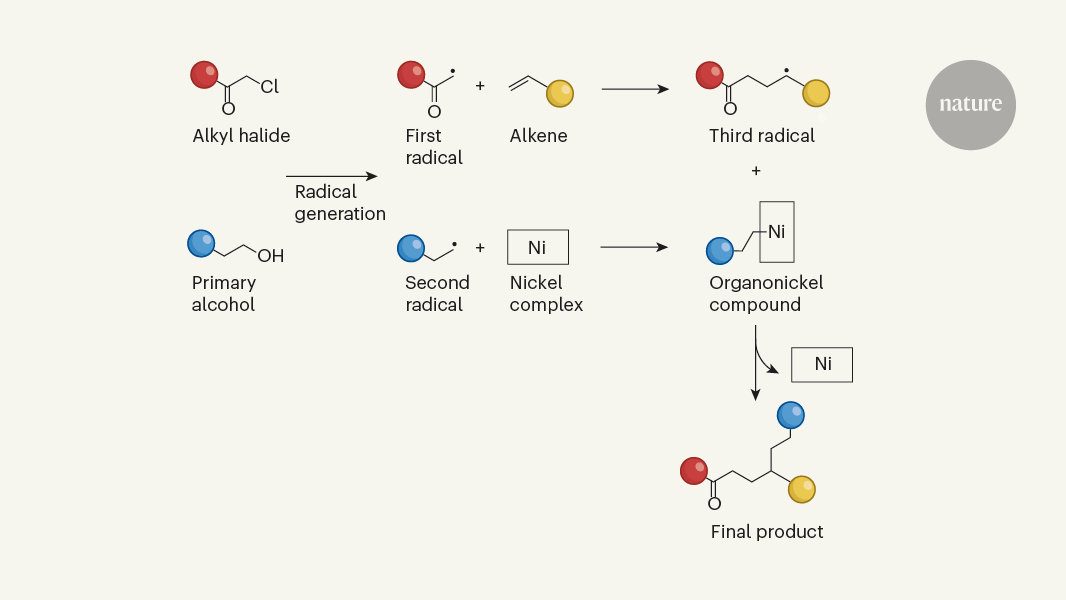Harnessing Radical Reactions for Efficient Carbon-Carbon Bond Formation in Organic Synthesis
Alapfogalmak
Chemists have developed a remarkable level of control over highly reactive free radicals to enable the ordered construction of complex molecules through simultaneous reactions involving three distinct radical species.
Kivonat
The content discusses the importance of carbon-carbon bond formation in the synthesis of pharmaceuticals, agrochemicals, and advanced materials. Chemists have been steadily improving their ability to harness highly reactive free radicals for this purpose. The article describes a recent breakthrough reported in Nature, where researchers have achieved a remarkable level of control over three different types of radicals acting simultaneously in a single reaction. This is enabled by an emerging strategy in organic chemistry known as "radical sorting", which allows the distinct roles of the three radical species to be precisely orchestrated. The content highlights the growing sophistication of chemists' skills in manipulating these highly reactive intermediates to construct complex molecular structures in an ordered manner.
Trio of radicals choreographed for versatile chemical reaction
Statisztikák
The formation of carbon–carbon bonds is at the heart of the chemistry used to synthesize pharmaceuticals, agrochemicals and advanced materials.
Idézetek
"The secret to success lies in an emerging strategy for organic chemistry, known as radical sorting."
Főbb Kivonatok
by Kenneth F. C... : www.nature.com 04-03-2024
https://www.nature.com/articles/d41586-024-00735-z
Mélyebb kérdések
How can the "radical sorting" strategy be further expanded and applied to enable even more complex and diverse molecular constructions?
The "radical sorting" strategy can be further expanded by exploring the use of different types of radicals with varying reactivities and selectivities. By carefully designing the reaction conditions and the structure of the radicals involved, chemists can achieve more intricate molecular constructions. Additionally, the development of new radical precursors and catalyst systems can enhance the scope and efficiency of this strategy. Furthermore, incorporating computational methods to predict the behavior of different radical species in a reaction can aid in the rational design of complex molecular structures.
What are the potential limitations or challenges in maintaining such a high degree of control over multiple reactive radical species in a single reaction?
One potential limitation is the difficulty in selectively generating and controlling multiple radical species simultaneously. The reactivity and stability of radicals can vary widely, making it challenging to orchestrate their interactions in a controlled manner. Moreover, the presence of competing side reactions or undesired radical coupling pathways can hinder the desired molecular construction. Additionally, the need for specialized equipment and expertise in handling highly reactive radicals poses safety concerns and technical challenges in maintaining precise control over the reaction conditions.
How might the insights from this work on radical-mediated carbon-carbon bond formation inspire the development of new synthetic methodologies in other areas of organic chemistry?
The insights gained from the radical-mediated carbon-carbon bond formation can inspire the development of new synthetic methodologies in various areas of organic chemistry. For instance, the concept of radical sorting can be applied to the synthesis of complex natural products, functional materials, and bioactive compounds. By leveraging the reactivity and selectivity of different radical species, chemists can devise innovative strategies for constructing diverse molecular architectures. Furthermore, the success of radical-mediated reactions may encourage researchers to explore unconventional bond-forming processes and catalytic systems in organic synthesis, leading to the discovery of novel transformations and reaction mechanisms.
0
